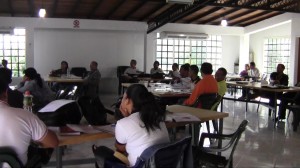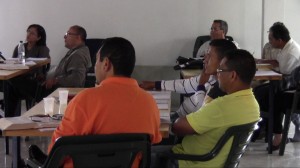 October is always busy. For the last five Octobers, it has been a series of conferences in 3 different countries, and this one is no different.
October is always busy. For the last five Octobers, it has been a series of conferences in 3 different countries, and this one is no different.
The Wesleyan Seminary of Venezuela (founded by a United Methodist Church in Georgia) has established a ministry school in the central Venezuelan city of Barquismeto.
It provides continuing academic training for current pastors, church planters and those who are working towards becoming pastors.
Named after John Wesley (vs the denominational tradition), the 10 year old school is non-denominational in approach and our class had several students from different denominations.
Without this school, students have said there is no other place to get this kind of training.
In terms of our family’s calling, and my calling in particular, – this school is the sweet spot of our calling — helping pastors wrestle and grow with how to lead evangelism in a congregation.
Focus of the pastor’s class
This particular course focused on pastors themselves as evangelists, active witnesses in sharing their faith as pastors and church planters.
My co teacher, Dan Dunn, and I organized our material around 7 axioms of evangelism
 Abundance
Abundance- Prayer
- Eternal
- Love
- Preparation
- Process
- Proximity.
We covered all 7 during the 32 hour class. Most of the time was spent on evangelism axioms 5, 6, and 7, with a lot of time to pray through the implications of the material.
We touched on many models, methods, manners, and how to mix them all up to help create a vibrant evangelism plan in the congregation.
Each student created their own plan of action to set out to accomplish at their churches in the next few months.
The impact
I’ll share more in related posts, but here is one testimony that stood out (I paraphrase):
“This class has helped me see that I’ve been too busy with the church to have any relationships with non believers. That will now change.”
Statements like this were repeated by others.
As evangelism trainers, Dan and I are convinced that unless pastors
- personally involve themselves in the lives of irreligious people and
- do the hard work of evangelism themselves,
they will lack the ability to lead evangelism training in the congregation.
These students saw that they needed to start making some new friendships with unbelievers and strengthen existing ones.
They know they don’t need to “get out of the church” (as in leave their duties behind), but get out of the church more regularly to do the personal work of evangelism. Some of what qualifies as church work can be set aside, delegated, or ignored. . . 🙂






Recent Comments